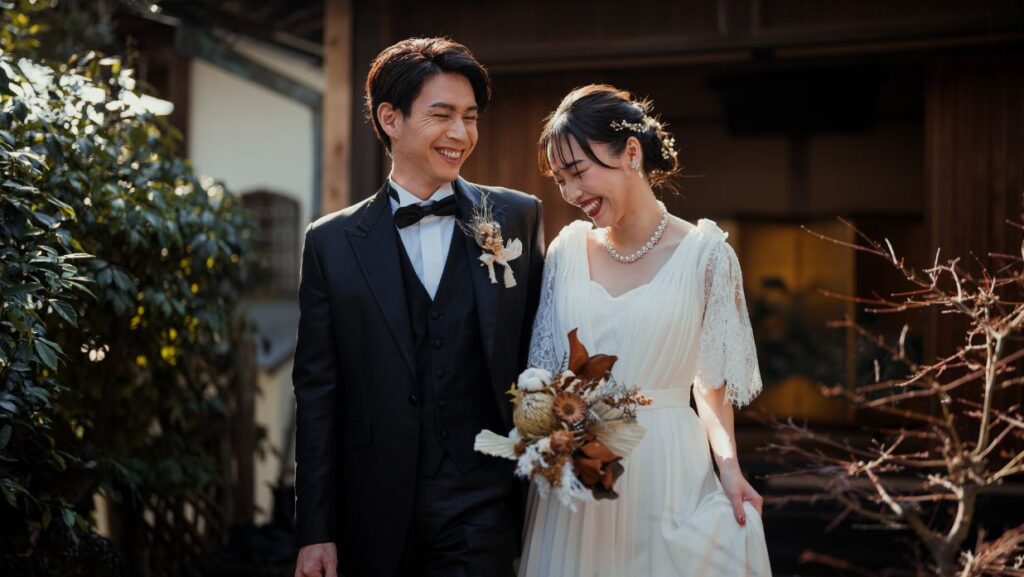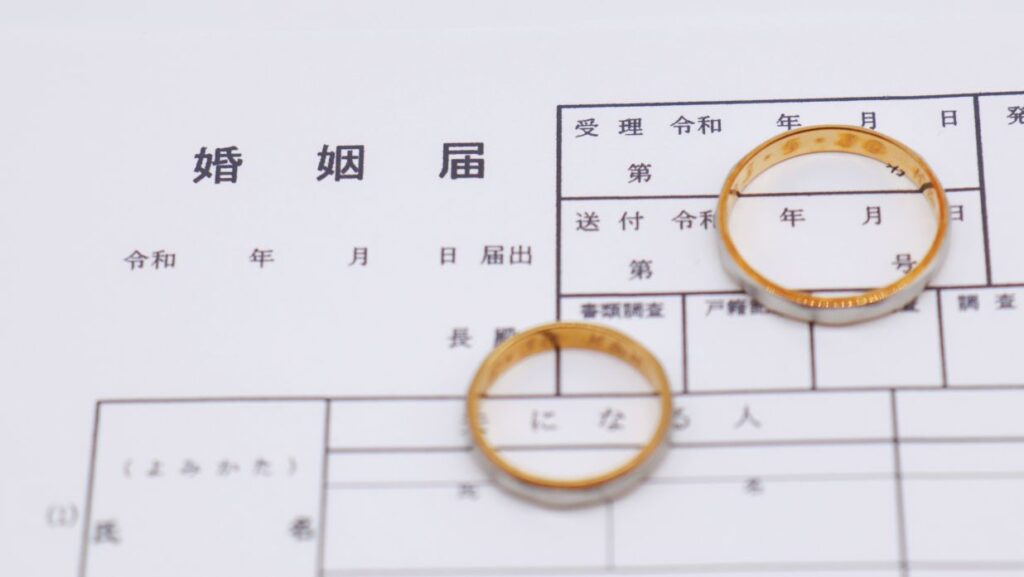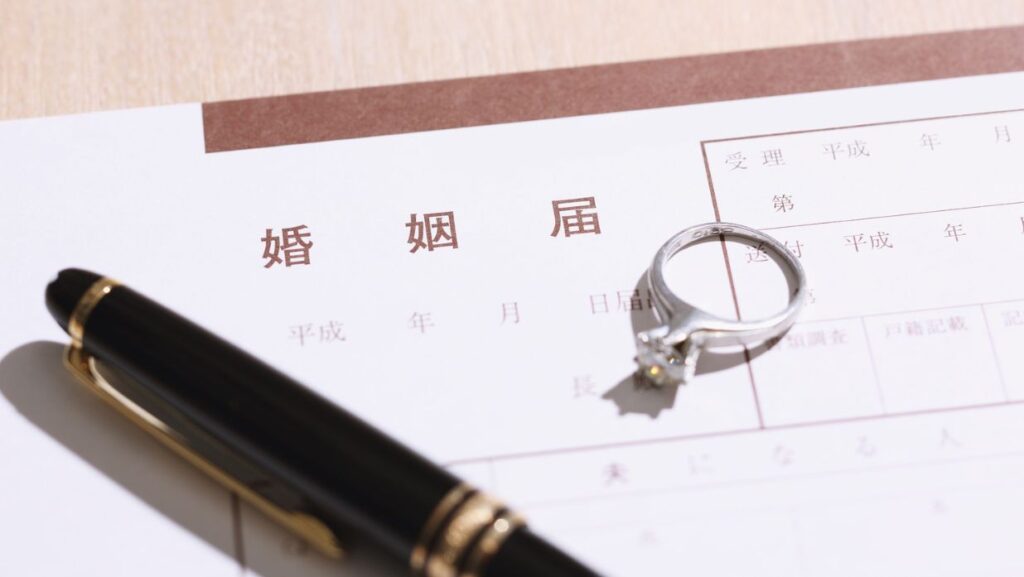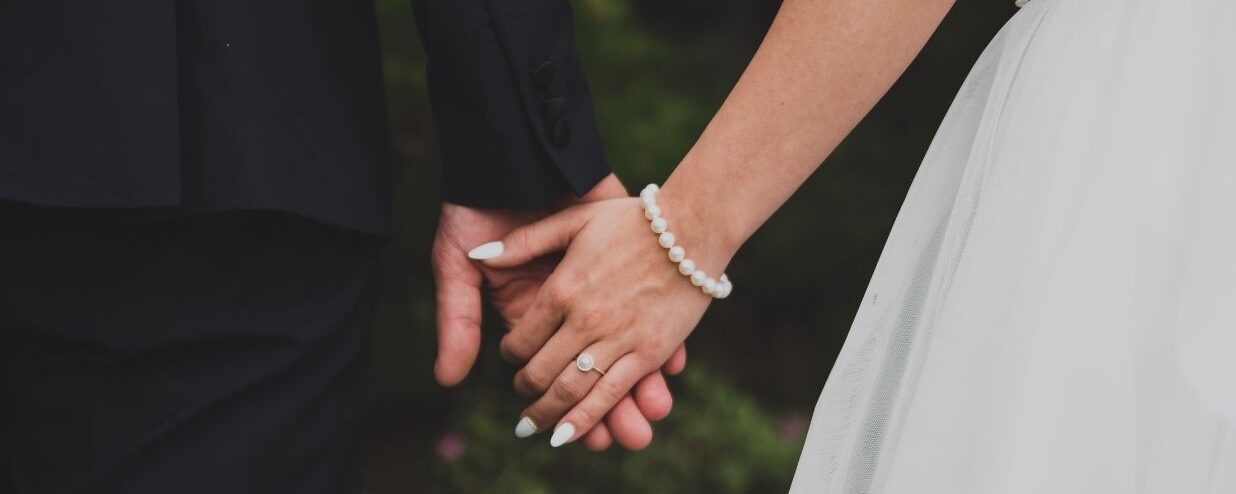Congratulations! You have found the partner whom you want to spend the rest of your life with and have decided to get married in Japan. Except, how do you do that? Does one of you need to be a Japanese national? How is marriage recognized in Japanese law?
While marriage is a symbol of the special bond you and your partner share, it also serves as the official way for the Japanese government to legally recognize your union. If you’re a foreigner navigating Japan’s bureaucracy, taking this step might feel overwhelming. Fortunately, getting legally married in Japan is actually one of the more straightforward procedures.
In this guide, we’ll walk you through the entire process, from who can get married to what documents you’ll need to officially say “I do”.
Who can get married in Japan?

In Japan, marriage is primarily regulated by the Japanese Civil Code, and the rules depend on nationality, age, and legal status.
The general rule in Japan is that anyone aged 18 or older can legally get married. This change came into effect in 2022, when the Civil Code was revised. Previously, the minimum marriage age was 18 for men and 16 for women, but it has now been standardized to 18 for all genders.
There are a few things to note, of course. First of all, bigamy is illegal, and you cannot marry a close relative or an immediate family member. Suppose you are marrying in Japan as a foreigner or marrying a foreigner. In that case, that person must provide a Certificate of No Impediment — proof that they are legally free to marry — issued by their home country’s embassy.
Another unusual yet real restriction in Japan’s civil code is that women are not allowed to remarry within 100 days of their divorce. Although this rule may seem outdated, it was originally introduced to address concerns about paternity. In the past, the waiting period was six months, intended to prevent confusion about a child’s biological father if a woman was already pregnant and remarried immediately after divorce.
However, due to human rights concerns, Japan revised its civil code in 2016. Women can now remarry immediately after divorce if they submit a doctor’s note confirming they are not pregnant. The same revision also shortened the waiting period from six months to the current 100 days.
Thankfully, international marriage is becoming increasingly common in Japan, especially as more international residents move here as expats. Couples can legally marry in Japan through the Japanese civil registration system—not through a church or ceremonial wedding. The couple must register the marriage at their local city or ward office. Once registered, the marriage is legally recognized in Japan.
Can a same-sex couple get married in Japan?
Unfortunately, same sex marriage is still not officially recognized in Japan. However, this doesn’t mean that there hasn’t been progress. Different municipalities, including all of Tokyo, do grant some form of recognition for same sex partnerships called the Partnership System, or 同性パートナーシップ制度 (dousei paatonaashippu seido).
This partnership does allow some benefits, such as hospital visit rights or for housing matters. However, this recognition is not equal to the actual Marriage Recognition certificate since it is not legally binding and doesn’t provide any of the same legal benefits. Same-sex couples in Japan may still face challenges when renting an apartment or applying for housing loans, as they are not legally recognized as a family under national law.
But do know there are significant steps being made towards greater equality for marriage rights for all people.
Can foreigners get married in Japan?
Yes, foreigners can legally get married in Japan—even if both partners are non-Japanese. Unlike places such as the United States, which often require a special fiancé(e) visa or pre-approval to marry, Japan allows foreign couples to marry through its civil registration system. You don’t need to be a resident of Japan, and there’s no minimum number of days you must be in the country before registering your marriage.
Even if both parties are foreign nationals, as long as both are permitted to marry in their own country and are not already married, you can get legally married in Japan. But foreigners do have to obtain certain additional documents, such as the Certificate of No Impediment, 婚姻要件具備証明書 (kon in youken gubi shoumei sho).
However, you do not need a Japanese visa or residency to get legally married. A tourist on a temporary visitor visa (or visa-free entry) can legally marry in Japan. At least one partner must be able to complete the marriage registration (kon’in todoke / 婚姻届) at a Japanese city or ward office — usually the Japanese partner, or a foreigner who speaks Japanese or has support. You do not need to be in Japan for a minimum number of days to marry
One small note: If you are in Japan on a tourist visa, some city offices may ask how you would like to fill out the address field on the marriage registration form. In most cases, simply writing “overseas” or your country name will be sufficient, but it’s best to check with the local municipal office in advance.
After your marriage is officially registered, you’ll receive a Certificate of Acceptance of Marriage (婚姻届受理証明書). You should also report your marriage to your home country if you want it to be legally recognized there. Each country has its own requirements for this, so check with your embassy or local government office to understand what’s needed.
If getting married whilst a tourist, check how the municipal office would like you to fill out the address field on the konin todoke – they may just require ‘overseas’ rather than a specific address or, indeed, a specific country.
What does getting married in Japan allow?
So what does marriage allow in Japan? Once your marriage is legally registered in Japan, you receive several legal benefits, some could include:
- Eligibility for spousal visa if one partner is a foreign national and the other is either a Japanese Citizen or a Permanent Resident
- Inheritance rights,
- Joint tax filings and certain tax deductions
- National health insurance as a dependent and the ability to register as a spouse on legal documents or residence certificates (住民票)
Japan does not automatically change nationality through marriage, but as mentioned above, legally registering your marriage allows your partner to be eligible for visas such as the spousal visa if the other is a citizen or a permanent resident. If one partner has a work visa, the other can also apply for a dependent visa to live in Japan together. However, this visa generally doesn’t allow full-time work.
If you are planning on working in Japan, read our blog to discover everything you need to know and what types of jobs are available for foreigners.
Process of getting married in Japan

Now, let’s finally break down the step-by-step process for getting married in Japan. The process is actually quite simple, since for the most part, you just have to provide the required documents.
1. Obtain a “No Impediment To Marry” certificate
Also called 婚姻要件具備証明書 (kon in youken gubi shoumei sho), which is issued by your home country’s Japanese embassy, this document essentially proves there is nothing that would impede the marriage and that the applicant is permitted to marry.
This document is only required by a foreigner who is getting married in Japan. This document can be obtained from your country’s embassy or consulate and typically costs around 5,500 JPY. However, fees may vary, so please check with your embassy or consulate for the exact amount.
2. Fill out and submit and “Marriage Registration” 婚姻届 (Kon-In Todoke)
You’ll need to complete your marriage registration form at your local city hall or ward office. The form requires signatures from two witnesses. They can either sign it on the spot at city hall or you can have them sign it in advance by printing the form online.
If you’re hoping for a specific or memorable wedding anniversary date, keep in mind: the date your marriage is registered on that form will become your official date of marriage!
Tip: You can fill out the form on the same day at city hall. However, because the two witness signatures are required, it’s a good idea to ask them to sign in advance. That way, you’ll only need to complete your part when you arrive.
3. Provide all necessary identification documents
This can include residence cards, passports, and any other proof of identification. For foreign nationals, you will need to submit an official birth certificate (not a copy) and a Japanese translation. Japanese nationals do not need to provide their birth certificate.
4. Submit Proof of Family Registration: Koseki Touhon (戸籍謄本)
For Japanese nationals, you may need to submit a “Proof of Family Registration” or 戸籍謄本 (koseki Touhon). This document might be required if your fiancé is Japanese and was born in a different municipality from where they’re getting married.
If this is one of your first times going to a city or ward office, read our survival guide on visiting a kuyakusho 区役所.
What to do after submitting your documents for marriage
After you have submitted all the documents needed, your local office will process your submission and ensure everything is in order to legally register the marriage. Once your marriage is accepted, you will either receive one of the following:
1. Certificate of Acceptance for Notification of Marriage: Kekkon todoke juri shoumeisho (婚姻届受理証明書)
This document just proves your marriage was registered at your local office and displays basic information of the applicants such as names, birthdates, nationalities, and date of registration.
2. Certification of Information Recorded on Marriage Registration: Kekkon todoke kisai jiko shoumeisho (結婚届記載事項証明書)
This document can also serve as your proof of marriage in Japan in case the other certificate isn’t sufficient. So, we recommend you request a copy since it’s not automatically issued to you.
How much does it cost to get married in Japan?
Getting legally married in Japan might be cheaper than you think. By far the biggest burden on your wallets will be the wedding ceremony itself. Otherwise, you just have to pay a few small fees for issuing some of the certificates and documents we discussed earlier. Below are the fees you probably need to pay:
| Certificate/Document | Cost |
| No Impediment To Marry Certificate (婚姻要件具備証明書) | ¥5,500~ depending on the embassy |
| Acceptance for Notification of Marriage (婚姻届受理証明書) | Standard version: ¥350Decorated Version: ¥1400 |
| Translation of documents (if applicable) | Can vary around ¥10,000 – ¥12,000 |
Do I get a visa after getting married in Japan?

Getting married in Japan, even to a Japanese citizen, does not automatically grant you permanent residency or citizenship. These are separate processes that you’ll need to apply for after marriage.
Generally, if you are married to a Japanese citizen or permanent resident, you may become eligible for permanent residency after living in Japan for at least one year and being married for at least three years. If your spouse is in Japan on a specific visa—such as a working visa—you can apply for a dependent visa to stay in the country as their spouse.
However, the exact process and timeline can vary depending on your personal situation. It’s best to check with the immigration office to understand the specific requirements and steps involved.
What kind of marriage ceremonies are in Japan?
If you have ever attended weddings in Japan, you might have experienced both Western, or youshiki (洋式), and traditional Japanese, or washiki (和式). So, now that you’re done with the legal formalities, what type of ceremony is right for you?
和式 (Washiki): Traditional Japanese Wedding
The traditional Washiki wedding consists of Shinto customs taking place at a shrine. The wife wears a white kimono, which she later changes to a one that is vibrant and colorful one, while the groom wears a traditional kimono with hakama pants. Perhaps the most vital part of the ceremony is the sake sharing or san-san-kudo, where the couple drinks three cups of sake, followed by their family doing the same.
洋式 (Youshiki): Western Wedding
The Western wedding is somewhat similar to weddings in Western nations like America. The wife wears a white dress, and the ceremony takes place in a chapel (which isn’t always real), hotel, or some other venue. However, the ceremonies don’t have to be religious even if they take place in a chapel. Also, western weddings tend to be rather formal events that aren’t celebrated with loud music or grandiosity.
No matter which style of wedding you choose, it is customary for guests to give money in cash, enclosed in a special envelope used for weddings.
Conclusion: Learn Japanese for a smoother marriage process!
Whether you’re a foreigner marrying a Japanese citizen, a couple living abroad, or simply curious about Japan’s process, getting married in Japan is straightforward — at least legally. While cultural wedding traditions vary, the legal process centers on a simple civil registration.
If you’re ready to tie the knot in Japan, start with your city hall’s marriage registration process, and then celebrate in your own style, whether it’s traditional, modern, or somewhere in between.
To make marrying in Japan smoother, learning Japanese is crucial, especially if you plan to live here with your partner. Start learning Japanese today and start using the essential language for everyday life with ease. Fill out the form below for a free Japanese level check with Coto Academy and consultation!
FAQ
Can foreigners get married in Japan?
Yes, foreigners can get married in Japan. As long as both individuals meet the marriage requirements of their respective home countries and are at least 18 years old, they can legally marry in Japan.
Is same-sex marriage allowed in Japan?
Unfortunately, same sex marriage is not officially recognized in Japan in a legal capacity. While many municipalities do grant some form of recognition for same sex partnerships, it doesn’t come with most of the legal benefits as legally registered marriages.
Does your visa status change when you get married in Japan?
Getting married in Japan does not automatically change your visa status; however, getting married allows you to change your status to a spouse visa if one of the parties is a Japanese citizen or a permanent resident. If one of the parties holds a work visa or student visa, they could bring their spouse on a dependent visa.
Like what you read? You might be interested in:
